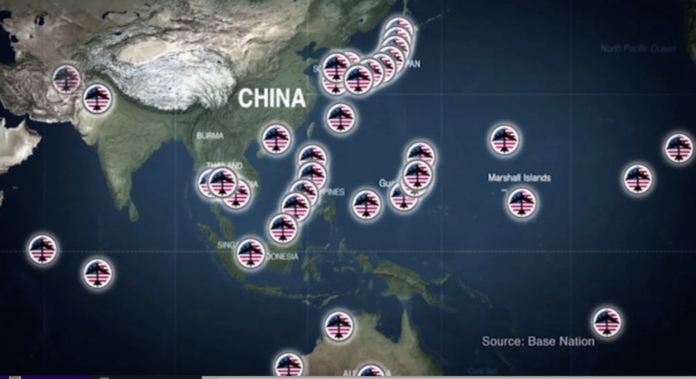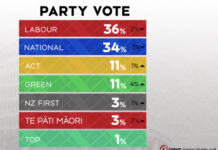A simple explanation of this week’s military and political developments in the Pacific
China National People’s Congress – Key security points
This week China’s parliament, the National People’s Congress (NPC) met to confirm policy and budgets. This meeting is important because although the conference has no real power, its meetings are an opportunity for China to publicly state policy. The key security points were:
Increased military spending
China will increase its annual defence budget by 7%, taking China’s military budget to approx. US$ 230 billion.
The increase in spending is approx. US$ 16.1 billion. Or; to put this increase into perspective by itself the increase alone represents:
- Slightly more than half Australia’s annual defence budget (US$ 30 billion).
- Roughly a third of Japan’s annual defence budget (US$ 55 billion), even after Japan’s recent 20% increase in defence spending.
- Almost the same amount as Taiwan spends on defence annually after their recent 15% increase in annual defence spending (US$ 19.2 billion)
- About four times New Zealand or the Philippines annual defence budgets (US$ 3.8 billion and US$ 4.2 billion respectively).
- Before the Ukraine War, Russia’s annual defence budget was approximately US$ 60 billion, roughly a quarter of China’s.
Although China’s defence budget is dwarfed by United States military spending, America has world-wide defence commitments. China’s defence focus is squarely in the Indo-Pacific regions making this increase significant for Pacific nations caught in the middle of Sino-American competition.
China positions itself in opposition to the United States
Chinese rhetoric sought to position the United States as an aggressor seeking to isolate China. The retiring Premier Li Keqiang stating that “external attempts to suppress and contain China are escalating” and Foreign Minister Qin Gang continuing this theme blaming the United States for current tensions. He also drew a link to the United States support of Ukraine, playing to the idea that the war in Ukraine is a ‘proxy war,’ stating that the ‘invisible hand’ of the United States is keeping the war going in order to isolate and damage Russia.
‘Suppression and containment’ are key terms in Qin Gang’s address to media; and in Li Keqaing’s speech. Essentially, China’s position is that by supporting and reinforcing countries like Japan, Australia, Taiwan (although China disagrees about Taiwan’s status) and the Philippines the United States is physically isolating China, blocking access to maritime trade routes. Further, that this strategy is motivated by economic competition rather than by a commitment to maintaining peace or the international rule of law.
And: in fairness isolation of China is Washington’s military strategy, however China’s argument that this strategy is directly linked to economic competition is propaganda. China’s aggressive actions in the South China Sea, East China Sea and towards Taiwan are the genesis of the region’s concerns. And; the United States’ developing military strategy in the region is a response to those concerns. This is information war; China playing to global anti-American sentiments aiming to win international support by portraying the United States as the aggressor.
Papua New Guinea government orders corruption probe into port deal
On 6 March 2023, the Papua New Guinea government ordered an investigation of corruption allegations made in Australian media and by the Organised Crime and Corruption Reporting Project. The allegations relate to an international company paying bribes via an Australian contact to secure valuable contracts relating to the port.
Corruption is a key security risk because it provides an opportunity for foreign powers to secretly build influence within another country.
This type of activity is not uncommon around the world. However, it is important that now the allegations have been made the Papua New Guinea government is investigating because the only way to prevent corruption is a free media supported by effective governance.
Japan supporting governance in the Pacific
The United Nations and Japan recently confirmed that Japan will continue funding United Nations Development Programme work in the Pacific to improve governance. Fiji, the Federated States of Micronesia, Kiribati, Palau, the Solomon Islands and Vanuatu will all receive support strengthening their governments; aiming to improve democratic participation, transparency and state sector effectiveness.
The support will fund a project building on similar work done between 2018 and 2022.
Japan’s commitment contributes to security and stability in the Pacific region. By improving governance Japan is helping ensure that smaller Pacific nations are less likely to be influenced secretly by foreign powers. Japan’s actions represent a sensible commitment to long-term regional stability because effective governance increases trust and confidence in governments both within their state and amongst other nations reducing the risks of political instability.
The proliferation of ‘Mature Precision Strike’; its ramifications in the Pacific
What on earth does ‘mature precision strike’ mean? And; how does it effect the Pacific? Mature precision strike means that militaries now have the ability to destroy targets at long-range. We are seeing this evolution right now in Ukraine, as Ukrainian HIMARS, missiles and drones accurately kill Russian generals, sink Russian ships and destroy ammunition dumps deep behind the front line.
This capability is changing the way that any war will be fought in the Pacific. Sino-American military competition has hinged around China’s ability to compete against American carrier battle groups. Aircraft carriers have been America’s key form of power projection since World War Two and until recently their expense, ability to strike at long-range and mobility meant that no other country could compete against them.
However, even carrier battle groups can be defeated if they are swamped by enormous numbers of accurate long-range missiles. A strategy that China has been developing for a long-time, aiming to use these weapons to create an exclusion zone within which it is too dangerous for the United States to deploy large and expensive carrier battle groups. The Ukraine War demonstrates that as precision guidance gets cheaper and easier to acquire this strategy is coming to fruition.
So, in the Pacific we are starting to see an evolution of military force and the way in which it will be employed. For instance, in recent weeks we have discussed the following activity that demonstrates this trend:
- The United States Marine Corps’ new Littoral Marine Regiments (LMR). A very light force designed to operate in very small, very mobile groups within the Weapon Effect Zone (WEZ) of an enemy loaded with precision guided long range weapons. The LMR breaking down into small, hard to target teams that can secure bases for counter strike capabilities like air craft or cruise missiles; and also seek out and destroy enemy surveillance assets. Preparing the way for larger more conventional units.
- Japan’s purchase of Tomahawk cruise missiles and building defence intelligence relationships to help provide the targeting information to use them effectively.
- Australia’s development of an armed drone. Ukraine demonstrates how important drones are in the new way of war because they provide a cheap, hard to target tool for gathering information and hitting targets within an enemy’s WEZ.
The next steps in this developing story will be about soft power, about gaining access to land on Pacific nations that can be used as bases during conflict. The competing nations within the Pacific Region all working hard to build political influence in the region so they can build a network of bases during peacetime, that in war can be used to extend the range of their surveillance and precision strike capabilities.
Ben Morgan is a bored Gen Xer and TDBs military blogger





Dunno who Ben is trying to reach or impress with these columns running defense for US Imperialism…they are becoming rather tiresome because of the obvious partisan nature and recycling of US military channel material.
Thanks again Ben always an interesting read and appreciate all your hard work on these.
Ditto from me.
China just secured a major breakthrough peace agreement between arch rivals ‘Iran & Saudi Arabia’. This is monumental threatening US hegemony (petrodollar) in the region which can only mean peace and that can only be good especially for the environment.
China isn’t an imperial state, China hasn’t threaten or invaded any countries and has lifted 100s of millions out of poverty. Taiwan isn’t a country it’s a part of China recognized by the US and world powers, so when the state department and US politicians claim China is being aggressive to Taiwan they must suffer severe amnesia or are purposely being provocative intentionally to create fiction.
The US is suppose to start war with China by 2025 according to the Rand corporation a western military think tank. According to there report that beyond 2025 China will overtake the US and that unacceptable so war is better than peace to the ruling elite in the US.
The US economy is inherently intertwine with the military. When europeans colonization was in full swing in the Americas the europeans built an economy on death of the native of hunting down the Indigenous Americans scalping their skulls for a profit and erasing them off their lands.
No war more peace is my moto.
https://www.rand.org/pubs/research_reports/RR1140.html
Ahh, yes the ol’ China has never invaded, attacked or threatened other countries. Unless you ignore their “Special Military Operations in –
Tibet 1949, Korea 1950, India 1962, Vietnam 1979, Russia 1969, Taiwan 1954 .
Then there are their Softly Softly Threats-
https://www.business-standard.com/article/international/china-threatens-japan-with-nuclear-war-over-intervention-in-taiwan-121072300030_1.html
https://www.aspistrategist.org.au/china-threatens-australia-with-missile-attack/
https://beta.ctvnews.ca/national/world/2022/8/25/1_6041594.amp.html
https://abcnews.go.com/Politics/wireStory/china-threatens-us-entities-balloon-incident-97215244
https://thediplomat.com/2017/07/alarming-escalation-in-the-south-china-sea-china-threatens-force-if-vietnam-continues-oil-exploration-in-spratlys/
Etc, etc, etc
Stephen March 15, 2023 at 9:45 am
” China isn’t an imperial state ”
Yes. Rather it considers itself a Civilizational state instead.
Something I came across in Eastern Media
Ed the Head, yes I know interesting times we are in? luckily NZ an ex-british imperialist state has until recently put better emphasis on the maori culture to interact with this phenomenon that becoming internationally recognized. The multi-polar world has arrived, China & Russia are 2nd and 3rd atm and they clearly envision themselves in this civilizational state. India another state, Iran etc…
Speaking of China, we must be about due for another of Creepy Key’s shameless slow anal lickin’ media episodes praising the CCP Chinese Criminal Party, suggesting all in NZ adopt the same subservience stance as he does.
Not sure a good portion of Kiwis will be so convinced though. Not all of us are on the same payroll.